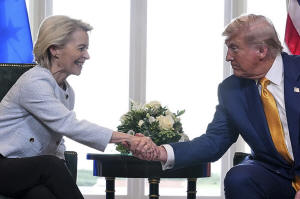US-EU deal sets a 15% tariff on most goods and averts the threat of a
trade war with a global shock
[July 28, 2025] By
WILL WEISSERT
EDINBURGH, Scotland (AP) — The United States and the European Union
agreed on Sunday to a trade framework setting a 15% tariff on most
goods, staving off — at least for now — far higher import duties on both
sides that might have sent shock waves through economies around the
globe.
The sweeping announcement came after President Donald Trump and European
Commission chief Ursula von der Leyen met briefly at Trump's Turnberry
golf course in Scotland. Their private sit-down culminated months of
bargaining, with the White House deadline Friday nearing for imposing
punishing tariffs on the EU's 27 member countries.
“It was a very interesting negotiation. I think it’s going to be great
for both parties,” Trump said. The agreement, he said, was “a good deal
for everybody” and “a giant deal with lots of countries.”
Von der Leyen said the deal “will bring stability, it will bring
predictability, that’s very important for our businesses on both sides
of the Atlantic.”
Many facets will require more work
As with other, recent tariff agreements that Trump announced with
countries including Japan and the United Kingdom, some major details
remain pending in this one.
Trump said the EU had agreed to buy some $750 billion worth of U.S.
energy and invest $600 billion more than it already is in America — as
well as make a major military equipment purchase. He said tariffs “for
automobiles and everything else will be a straight across tariff of 15%”
and meant that U.S. exporters ”have the opening up of all of the
European countries.”

Von der Leyen said the 15% tariffs were “across the board, all
inclusive” and that “indeed, basically the European market is open.”
At a later news conference away from Turnberry, she said the $750
billion in additional U.S. energy purchases was actually over the next
three years — and would help ease the dependence on natural gas from
Russia among the bloc’s countries.
“When the European Union and the United States work together as
partners, the benefits are tangible,” Von der Leyen said, noting that
the agreement “stabilized on a single, 15% tariff rate for the vast
majority of EU exports" including cars, semiconductors and
pharmaceuticals.
“15% is a clear ceiling,” she said.
But von der Leyen also clarified that such a rate wouldn’t apply to
everything, saying that both sides agreed on “zero for zero tariffs on a
number of strategic products,” like all aircraft and component parts,
certain chemicals, certain generic drugs, semiconductor equipment, some
agricultural products, natural resources and critical raw materials.
It is unclear if alcohol will be included in that list.
“And we will keep working to add more products to this list,” she said,
while also stressing that the “framework means the figures we have just
explained to the public, but, of course, details have to be sorted out.
And that will happen over the next weeks.”
Further EU approval needed
In the meantime, there will be work to do on other fronts. Von der Leyen
had a mandate to negotiate because the European Commission handles trade
for member countries. But the Commission must now present the deal to
member states and EU lawmakers, who will ultimately decide whether or
not to approve it.
Before their meeting began, Trump pledged to change what he
characterized as “a very one-sided transaction, very unfair to the
United States.”
"I think both sides want to see fairness,” the Republican president told
reporters.

[to top of second column] |

President Donald Trump and European Commission President Ursula von
der Leyen shake hands after reaching a trade deal at the Trump
Turnberry golf course in Turnberry, Scotland Sunday, July 27, 2025.
(AP Photo/Jacquelyn Martin)
 Von der Leyen said the U.S. and EU
combined have the world's largest trade volume, encompassing
hundreds of millions of people and trillions of dollars and added
that Trump was “known as a tough negotiator and dealmaker."
“But fair,” Trump said.
Trump has spent months threatening most of the world with large
tariffs in hopes of shrinking major U.S. trade deficits with many
key trading partners. More recently, he had hinted that any deal
with the EU would have to “buy down” a tariff rate of 30% that had
been set to take effect.
But during his comments before the agreement was announced, the
president was asked if he'd be willing to accept tariff rates lower
than 15%, and he said “no.”
First golf, then trade talk
Their meeting came after Trump played golf for the second straight
day at Turnberry, this time with a group that included sons Eric and
Donald Jr. In addition to negotiating deals, Trump's five-day visit
to Scotland is built around golf and promoting properties bearing
his name.
A small group of demonstrators at the course waved American flags
and raised a sign criticizing British Prime Minister Keir Starmer,
who plans his own Turnberry meeting with Trump on Monday.
Other voices could be heard cheering and chanting “Trump! Trump!” as
he played nearby.
On Tuesday, Trump will be in Aberdeen, in northeastern Scotland,
where his family has another golf course and is opening a third next
month. The president and his sons plan to help cut the ribbon on the
new course.
The U.S. and EU seemed close to a deal earlier this month, but Trump
instead threatened the 30% tariff rate. The deadline for the Trump
administration to begin imposing tariffs has shifted in recent weeks
but is now firm and coming Friday, the administration insists.

“No extensions, no more grace periods. Aug. 1, the tariffs are set,
they’ll go into place, Customs will start collecting the money and
off we go," U.S. Commerce Secretary Howard Lutnick told “Fox News
Sunday" before the EU deal was announced. He added, however, that
even after that “people can still talk to President Trump. I mean,
he’s always willing to listen.”
Without an agreement, the EU said it was prepared to retaliate with
tariffs on hundreds of American products, ranging from beef and auto
parts to beer and Boeing airplanes.
If Trump eventually followed through on his threat of tariffs
against Europe, meanwhile, it could have made everything from French
cheese and Italian leather goods to German electronics and Spanish
pharmaceuticals more expensive in the United States.
“I think it’s great that we made a deal today, instead of playing
games and maybe not making a deal at all,” Trump said. “I think it’s
the biggest deal ever made.”
___
Associated Press writers Seung Min Kim in Cincinnati and Samuel
Petrequin in London contributed to this report.
All contents © copyright 2025 Associated Press. All rights reserved |